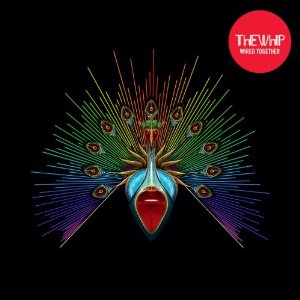It’s not rare, at least in the north-east, to see on a guitar shop’s pinboard a Musicians Wanted notice which concludes a scattergun list of influences – Nirvana, The Beatles, Rage Against the Machine, Kaiser Chiefs, Staind, and one from Radiohead, Coldplay, and Muse – with the passive-aggressive caveat ‘No Time Wasters – Commitment Essential’. Such advertisements barely conceal the narcissistic conviction that the poster of the message is fated to make it, irrespective of the musical style the hypothetical group eventually adopt. Presumably, this approach works occasionally. Maybe The Police met like this, and it’s not inconceivable that both Maximo Park and The Futureheads started life on a tatty piece of foolscap to the soundtrack of a salesperson demonstrating the opening bars of ‘Under the Bridge’ to mesmerised teenagers.
Although they’re from the rainier flank of the Pennines, The Whip have the air of Commitment Essential about them. Incarnated from the now-forgotten Nylon Pylon, the Manchester group nominally trade in a breed of dance-rock significantly obliged to LCD Soundsystem, The Rapture, and The Faint. Mixing punk immediacy with the simmering builds and euphoric ego-deaths of house was a template that at times worked fantastically well for those acts, but where one got the impression that their imaginative syntheses arose out of some genuine narcotic epiphany, The Whip seem nose-down to the textbook. There’s the punctiliously ‘sleazy’ name, for a start, but the music is even more likely than the moniker to project an image of an opportunistic, managerial decision to follow the path hacked out by James Murphy et al.
Wired Together, the band’s second studio album, is the work of a group trying hard to press buttons which began to stick some time ago. Mancunian music’s exploration of the alienated condition of post-industrial life dates to the late seventies, but The Whip appear concerned that their audience have yet to take heed of the appalling possibilities of the computerised age. To paraphrase, machines aren’t entirely benevolent and our dependence on them – this might surprise you – effectively transforms us into robots! These dire tidings are conveyed by songs with spuriously dystopian titles like ‘Metal Law’; many of them open with studiedly emotionless synth sweeps a la Cybotron or Section 25 but decay swiftly into the discopunk platitudes that the likes of The Bravery were called out on a long time ago. What’s particularly inescapable, though, is the sense that this music would sound essentially the same regardless of what genre it envisioned itself belonging to.
For all of their forays into club music, their rented beats and burbling electronic textures, the band The Whip most closely resemble are Hard-Fi, another set of grafters who bounced back from the disillusionment occasioned by previous failures. In fact, second track ‘Secret Weapon’ is pulled along by a synth line which is a close melodic relative of ‘Living for the Weekend’, last decade’s anthem to the notion that perspiration is always ultimately superior to inspiration. Accordingly, throughout Wired Together, what’s happening musically and lyrically repeatedly gets displaced by a disheartening picture of mid-afternoon slots at V or Wireless, students working without pay on the street teams, and newspaper interviews in which ‘media bullshit’ is denounced in favour of hard-to-pin abstractions like ‘honesty’ and ‘passion’. Workmanlike attitude is wearying enough when it’s transmitted by common-or-garden lad-rock bands, but it sits especially uncomfortably when its vehicle attempts to evoke house and post-punk, genres which were associated respectively with the hedonistic rejection of the everyday and incisive political and social critique.
Commercially, this is a record which has every chance of doing reasonably well, and one suspects that The Whip will spend much of next summer living the dream on the festival circuit. It seems fair to say, however, that the output of a band whose success depends on borrowing – dilettantishly – from the canons of electronic music and post-punk invites itself to be judged against its prototypes. ‘Shake’ quotes the juddering rhythmic refrain from Liquid Liquid’s ‘Optimo’, ignoring the fact that Clinic did this with far more subtlety on ‘The Second Line’; ‘Intensity’ is underpinned by one of those stabbing electro lines which curiously evoke thoughts of Eddie Murphy crossing Brooklyn Bridge in a convertible, but subordinates it to an insubstantial vocal that’s less Sylvester than Starsailor. The most pathos-tinged moment on Wired Together, though, is penultimate song ‘Best Friend’, which sounds far too much like The Killers – Commitment Essential USA – to be likable. One wonders whether or not this was taken into account during writing or recording: either way, it’s a faux pas which is emblematic of the album as a whole. It’s not pleasant to fault enthusiasm, but this is a piece of work in which good-quality ingredients have been handled without a great deal of tact.


